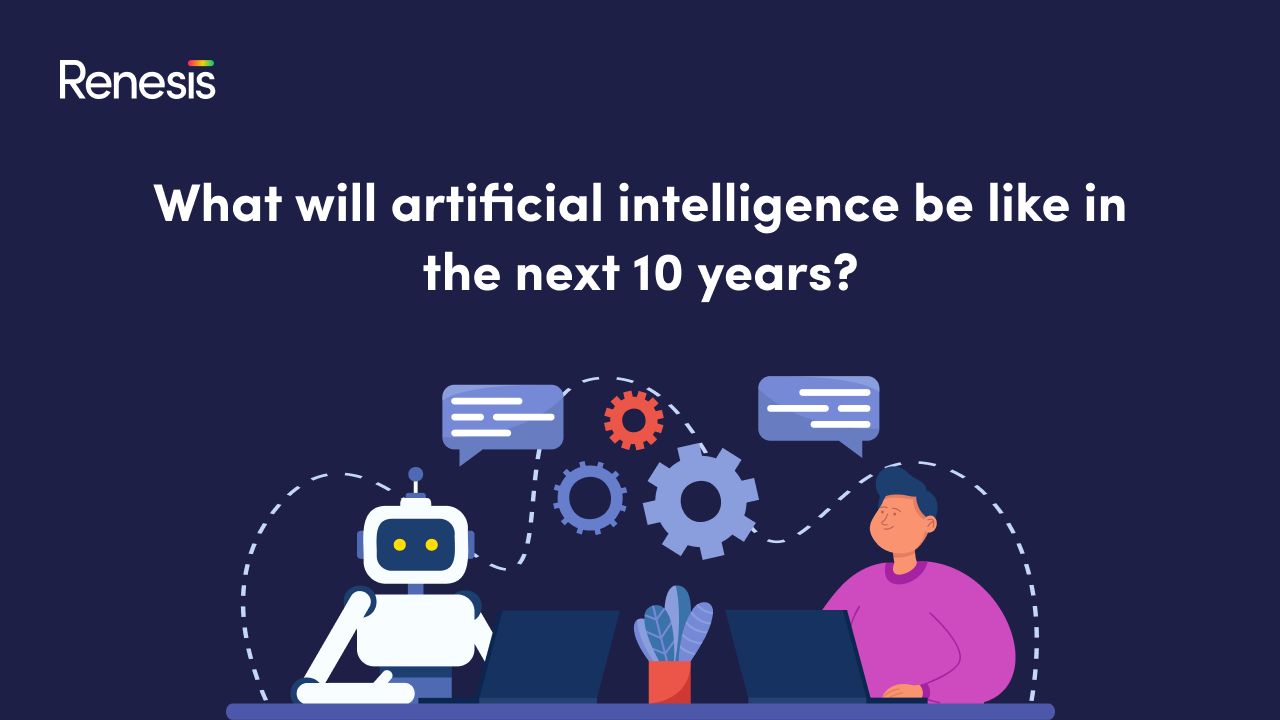What will Artificial Intelligence be like in the next 10 years?
Artificial intelligence (AI) is rapidly evolving. But, how will AI evolve in the future? There has been a lot of talk lately about artificial intelligence. The use of Artificial Intelligence can be found in a wide range of fields, including industry, business, medicine, automobile navigation, communication, military operations, and space exploration, among others.
In fact, 90% of businesses that have implemented artificial intelligence (AI) see it as essential for their long-term competitive strategy.
As this technology continues to expand into new industries and areas of our lives, we look at what the future holds for AI.
This article looks at some predictions for how AI will continue to grow and change in the next 10 years. Continue reading this blog!
What is Artificial Intelligence?
AI is a program that learns and thinks for itself. Basically, it is concerned with making machines that act and think like humans. Without being explicitly programmed, these machines can learn through machine learning.
Artificial Intelligence: What are the types?
There are several types of artificial intelligence. Here is a breakdown of what you need to know.
AI can be classified into four types: reactive, deliberative, intuitive, and embedded.
Reactive AI
It’s basically a set of rules that allow a machine to respond to a certain stimulus. For example, if you ask a chatbot to recommend a good restaurant in your area, it will use reactive AI to come up with a list of restaurants that match your criteria.
Deliberative AI
A machine can make decisions without the input of a human. So imagine you’re using a chatbot to book a flight. The chatbot will use deliberative AI to decide which flights meet your criteria and then book the best one for you.
Intuitive AI
It is similar to deliberative AI, but it’s not limited to decision-making based on rules. It allows machines to learn and make judgments on their own, just like humans do. So if you ask a chatbot to recommend a good restaurant, it may not have any pre-determined rules about what makes a good restaurant. Instead, it will use its intuition to come up with a list of restaurants that it thinks you’ll like.
Embedded AI
It is the most advanced type of AI. It’s when AI is integrated into everyday objects, like your smartphone or car. So for example, if you ask your smartphone to play music from your favorite artist, it will use embedded AI to identify your artist and play their music for you.
What will AI be like in the next 10 years?
AI applications are already changing our lives today, and their uses in the future will only continue to expand. Here are some potential uses of AI in the near future:
1. Machine Learning
Machine learning algorithms will lead to more accurate predictions about what’s going to happen in the world around us. We’ll be able to predict natural disasters, stock market fluctuations, and even find out if people are lying to us.
– AI systems will be able to create art and music, solve scientific problems, play chess, write novels, and diagnose illnesses.
– Robots will be able to help with household chores, perform dangerous jobs, and explore space.
– Self-driving cars will make long trips safer, smart transportation will reduce traffic congestion, and AI voice assistants will provide personalized customer service.
2. Transform Industries
AI won’t replace human labor entirely, but it will likely transform many industries over time. Today, AI performs tasks that humans once performed manually, such as writing reports and translating languages. As AI becomes increasingly capable, it may someday take over these activities completely.
3. More efficient and sustainable energy
AI can be used to optimize energy usage, making it more efficient and sustainable. In the future, AI-powered energy systems could help us transition to renewable energy sources and drastically reduce our carbon footprint.
4. More realistic and lifelike virtual assistants
Virtual assistants like Siri and Alexa are already becoming more and more common. In the future, these assistants will become even more realistic, able to hold conversations and carry out tasks that are more complex than today.
5. Improved medical diagnosis and treatment
AI is already being used in the medical field to diagnose diseases and recommend treatments. In the future, AI will become even better at diagnosing and treating medical conditions, potentially even outperforming human doctors.
AI has undergone constant evolution throughout its history. Each year has seen new advancements in the way AI can help us in our everyday lives.
As we move forward, AIS will certainly become more ubiquitous, bringing greater prosperity and enhanced well-being to the entire planet’s population.
In what ways will you prepare for the future of artificial intelligence? We would love to hear them!










